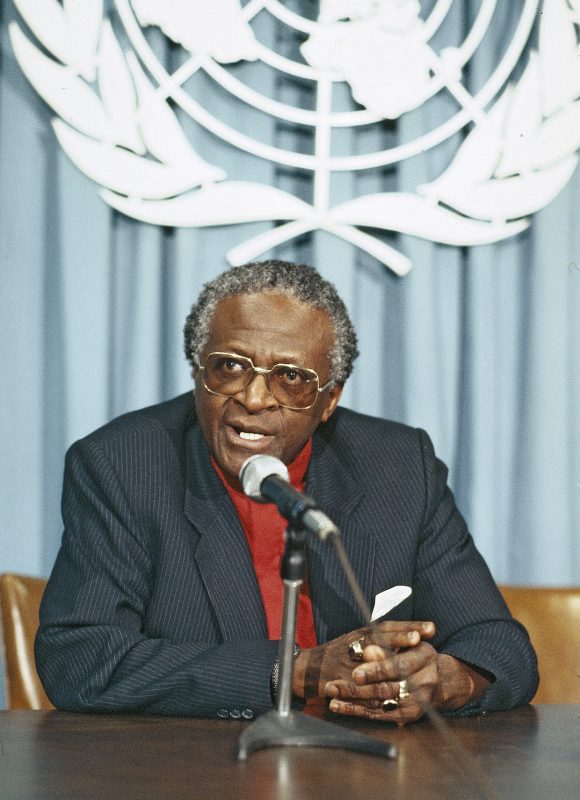PIONEER
Archbishop Emeritus Desmond Mpilo Tutu

Religious Leader | Teacher | Human Rights Activist
Born: 7 October 1931
“We have looked the beast in the eye. Our past will no longer keep us hostage. We who are the rainbow people of God will hold hands and say ‘Never again! Nooit weer! Ngeke futhi! Ga reno tlola!’”
Who is
Archbishop Emeritus Desmond Mpilo Tutu?
An activist, cleric, and fierce defender of human rights, sometimes referred to as South Africa’s moral conscience.
Professions
and Roles
Archbishop Emeritus of South Africa, priest, activist, teacher, lecturer, and chairperson of the Truth and Reconciliation Commission.
Best Known For
His outspoken criticism of apartheid, support for economic sanctions, and dedication to a free, non-racial, and non-violent South Africa.
Life highlights
- Tutu began working as a schoolteacher in 1954, despite his distaste for Bantu Education. He was admitted as a sub-deacon at Krugersdorp High School in 1955.
- Tutu later enrolled at St Peter’s Theological College in Rosettenville in 1958, and excelled there. He was ordained as a deacon and a priest at St Mary’s Cathedral in Johannesburg in 1960.
- Tutu continued his studies at King’s College in London in 1962, and ministered to white congregations in England for several years until he received his master’s degree in theology in 1966 and returned to South Africa in 1967 to teach theology. Upon his return, he spoke out publicly against apartheid.
- In 1975, Tutu was ordained as dean of St Mary’s Cathedral, and was the first black person to hold the position. He was appointed Bishop of Lesotho in 1976.
- Tutu became General Secretary for the South African Council of Churches in 1978, and used this position to criticise apartheid for being un-Christian. He continued travelling overseas to speak out against the evils of apartheid and encourage other countries to withdraw support of South Africa.
- Tutu was awarded the Nobel Peace Prize in 1984 for his efforts.
- He was made the Archbishop of Cape Town in 1986.
- Tutu was appointed chairperson of the Truth and Reconciliation Commission in 1995.
- He continued to travel, teach, and promote peace in the early 2000s. He retired from public life in 2010, but continues to promote peace and speak out against injustices.
IN THEIR OWN WORDS
“If you are neutral in situations of injustice, you have chosen the side of the oppressor.”
– Archbishop Desmond Tutu
“Perhaps oppression dehumanises the oppressor as much as, if not more than, the oppressed. They need each other to become truly free, to become human.”
– Archbishop Desmond Tutu, 1984
IN THE WORDS OF OTHERS
“I believe that God is waiting for the archbishop. He is waiting to welcome Desmond Tutu with open arms. If Desmond gets to heaven and is denied entry, then none of the rest of us will get in!”
– Nelson Mandela, former President of South Africa
“I think I’d call him a ball of energy … Bob Geldof calls him ‘the smallest giant’ he knows. He’s almost a compelling force of nature.”
– Mpho Tutu, the Archbishop’s youngest daughter
Frängsmyr, T and Adams, I (eds.) (1997), Peace, World Scientific, p. 120.
Kapelianis, A (6 October 2011), ‘Tutu: The Authorised Portrait’. Angie Kapelianis interviews the co-authors of the book, SABC News.
http://www.sabcnews.com/sabcnews/tutu-the-authorised-portrait/
McAfee Brown, R (1984), Unexpected News: Reading the Bible with Third World Eyes, Westminster John Knox Press, p. 19.
Sparks, A and Tutu, M A (eds.) (2011), Tutu: The Authorised Portrait, Pan Macmillan.
https://www.sahistory.org.za/people/archbishop-emeritus-desmond-mpilo-tutu
https://www.theelders.org/profile/desmond-tutu
https://www.youthforhumanrights.org/voices-for-human-rights/champions/desmond-tutu.html
